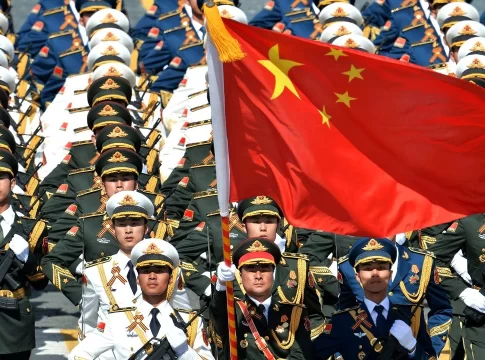China is constructing what is anticipated to be the world’s largest military command center, just west of its capital, Beijing. This sprawling complex, revealed through satellite imagery and scrutinized by U.S. intelligence agencies, encompasses a staggering 1,500 acres—approximately 30 kilometers from the heart of the city. This development marks a significant stride in China’s military ambitions, aiming to fortify its leadership against potential wartime scenarios, particularly in the face of nuclear threats.
The British newspaper, *Financial Times*, reports that the facility will dwarf the U.S. Pentagon by tenfold, stirring discussions about the strategic purpose behind such an immense project. U.S. officials suggest that this is not just an infrastructure expansion but a critical leap towards augmenting China’s preparedness for large-scale military operations, including nuclear engagements. With its anticipated completion by 2027, this state-of-the-art stronghold aligns with China’s military centenary celebrations—a symbolic milestone for the nation.
Dr. Li Wei, a renowned military analyst at the Shanghai Institute for International Studies, commented, “This facility underscores China’s commitment to cement its military prowess globally. The timing and scale of the project are indicative of a broader vision to project strength and ensure security resilience.”
The intent behind the complex extends beyond mere defense capabilities. Analysts indicate that it could serve as a critical node in China’s strategy to exert control over Taiwan and bolster its nuclear arsenal. This comes amidst President Xi Jinping’s clear ambition to elevate China’s military status, challenging other superpowers like the United States.
According to the Stockholm International Peace Research Institute, China’s defense budget has seen a consistent increase of about 6.8% annually, underscoring the nation’s resolve to enhance its military infrastructure. Moreover, security experts argue that facilities of this magnitude are pivotal for China to manage traditional and nuclear warfare scenarios concurrently.
Dr. Ahmad El-Sayed, a Middle East defense strategist and regular commentator in Egyptian media, highlights, “China’s construction of such a complex could be perceived as a power statement, instilling a sense of inevitable regional influence and military dominance.”
While questions linger about the underlying motives of China’s vast military expansions, the international community remains watchful. The unveiling of this complex raises significant discourse regarding its role in bolstering China’s security apparatus and its potential implications for regional and global power dynamics.


